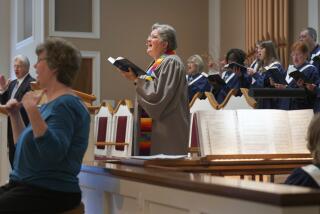Presbyterian Church Strikes Careful Balance in New Salvation Declaration
- Share via
COLUMBUS, Ohio — The nation’s largest Presbyterian denomination sidestepped a nasty battle this week by approving a statement on salvation theology that appeared to satisfy both liberals and conservatives.
More than 550 delegates from the 2.5 million-member Presbyterian Church (U.S.A.) are gathered in Columbus through today for the denomination’s 214th annual general assembly meeting.
Delegates endorsed an eight-page document, “Hope in the Lord Jesus Christ,” on a 497-11 vote. The statement was drafted by the church’s theology and worship office in September after a divisive battle over salvation and Jesus Christ at last year’s convention in Louisville, Ky.
“Jesus Christ is the only Savior and Lord, and all people everywhere are called to place their faith, hope and love in him. No one is saved by virtue of inherent goodness or admirable living,” the document says.
But, in an indirect reference to non-Christians, the document also says: “We neither restrict the grace of God to those who profess explicit faith in Christ nor assume that all people are saved regardless of faith. Grace, love and communion belong to God, and are not ours to determine.”
Conservatives were dissatisfied after last year’s meeting, leading to the growth of the insurgent Confessing Church Movement. More than 1,200 congregations have joined the movement by affirming, among other things, salvation through Jesus Christ alone.
The new statement garnered support from both the left and the right, in part because it leaves some theological wiggle room on the direct questions of salvation that have caused friction in the diverse church.
“It says modestly the things we need to say modestly, and it says clearly the things we need to say clearly,” said the Rev. Anna Case-Winters, a theologian at McCormick Seminary in Chicago, who chaired the meeting’s confessions and Christology committee.
Theology had become the newest area of contention in the denomination, after years of back-and-forth battles over human sexuality. Delegates to last year’s meeting, sensing the discord, appointed a panel to examine doctrinal divisions and report back in 2005.
Case-Winters said the church is suffering from battle fatigue and that this year’s civil debate showed “we’re moving to a different place.”
“It’s important for us to say together what we can say together, and for those things that we cannot say together, to keep talking,” she said after the vote.
Delegates declined to formulate a “new Confession of Faith for the 21st century,” opting instead to stand by the church’s exhaustive Book of Confessions, a collection of 10 doctrinal statements that was last updated in 1967.
Delegates also declined to approve an “authoritative interpretation” of the ordination vow professed by new pastors. The vow, which will remain intact, asks new pastors, “Do you trust in Jesus Christ your Savior, acknowledge him Lord of all and head of the church, and through him believe in one God, Father, Son and Holy Spirit?”
Conservative leaders said they were satisfied with the new document. The Rev. Joe Rightmyer, executive director of Presbyterians for Renewal, said his group gave the document a “hearty endorsement.”
“We’re even more elated that at this year’s general assembly ... the Christology issue is a matter of an expression of Christian unity rather than a source of great controversy and debate,” he said.
More to Read
Sign up for Essential California
The most important California stories and recommendations in your inbox every morning.
You may occasionally receive promotional content from the Los Angeles Times.













